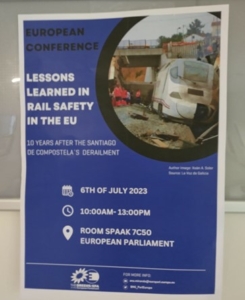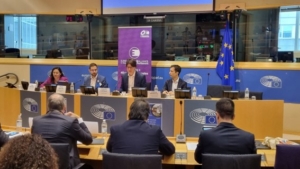 Last week on July 6th EPF was present at the European Parliament at the Conference “Lessons Learned in Rail Safety in the EU”, organized by MEP Ana Miranda (Greens, Spain).
Last week on July 6th EPF was present at the European Parliament at the Conference “Lessons Learned in Rail Safety in the EU”, organized by MEP Ana Miranda (Greens, Spain).
The conference aimed to commemorate the 10th anniversary of the Alvia train accident in Galicia (2013), which was one of the most tragic train accidents in recent decades in which 80 persons died and more than 140 were injured, and for which penal responsibilities are still pending to be determined at court. Nevertheless, the accident’s causes seem to be clear: the train was traveling over the speed limit in a curve where the visual and digital signals were insufficient to prevent human errors by the train drivers in a complex railway line with a succession of numerous tunnels and viaducts.
The first panel title was “Passenger rights and the situation of railway workers”. Moderated by MEP Ignazio Corrao (Greens, Italy). The first participant was Diego Marín Fernández from the Spanish Union of Railway Drivers (SEMAF), who emphasized the importance of independent railway accident investigations to incorporate lessons learned from accidents into actual operations. The discussion also touched on the differences in the transposition of European Directives into the national laws of each member state.
Jorge Morera (Board member of EPF) introduced the following points into the debate:
- Tickets should guarantee compliance with safety regulations and ensure that risks related to operators and infrastructure managers have been evaluated and mitigated
- In the event of an accident, information should be transparent and verified. Otherwise, passengers will feel distrust and lack confidence not only in the specific affected service but also in other public transport systems
- Best practices for accident investigations already exist, considering the perspectives of passengers. The cases of the UK and Belgium were cited as examples
- When safe infrastructure exists, services should be provided to all potential passengers, regardless of differentiating factors such as the size of the city they live in
- Journeys should be considered as door-to-door trips, and therefore, rights and guarantees should cover all segments of these journeys, including urban and suburban transportation
- Trains and public transport in general are still the safest modes of transportation
The second panel focused on “Rail Safety in Europe: Infrastructure, Risk Assessment, and Breaches”, moderated by MEP Tilly Metz (Greens, Luxembourg) and with the participation of Kristian Schmidt (DG MOVE), Josef Doppelbauer (ERA), Xose Carlos Fernández (Public Works Engineer) and Jesús Domínguez (president of the Alvia Accident Victims Association). The main topics discussed were the responsibilities of the European Union Agency for Railways (ERA) and Member States in train accident investigations, the hasty completion of the infrastructure where the rail accident occurred, and the appropriate actions train drivers should take when they identify safety vulnerabilities in the infrastructure.
The final panel, titled “The Fight for the Truth and the Assumption of Political Responsibilities,” was moderated by Fernando Varela (journalist). Representatives of the victims and MEP Ana Miranda expressed the difficulties they have faced in having their viewpoints considered in the accident investigation and ensuring transparency. Almost 10 years after the accident, criminal responsibilities are still pending determination, whereas no political responsibilities have been assumed.
Jorge Morera



 Stay informed!
Stay informed!